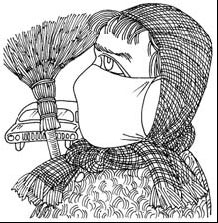'Original sin' of a wealthy entrepreneur
By Liu Shinan (China Daily)Updated: 2007-02-14 07:10
 "Your life isn't worth the cost of the scratch on the side mirror of my car,"
yells a luxury sedan driver to a sanitation worker, holding the worker by the
collar. He then presses the woman to kneel on the ground.
"Your life isn't worth the cost of the scratch on the side mirror of my car,"
yells a luxury sedan driver to a sanitation worker, holding the worker by the
collar. He then presses the woman to kneel on the ground.
This is not a scene in an old novel or movie describing the bourgeois class's cruelty toward the working class in pre-revolutionary old society. It happened in Jiangyin, Jiangsu Province, last Sunday morning. The driver is the boss of a private enterprise; the woman is an old model worker who has been cleaning the streets for 26 years.
The details: Xu Yunliang, owner of a large printing company, drove down a city street, scratching his car's side mirror on a garbage tricycle parked on the roadside by Wu Pingdi, the sanitation worker. The man abused and kicked the woman, physically forcing her to kneel down while she protested helplessly that it was not her fault.
Despite angry pedestrians, the man drove off. He later tried to silence the media by offering a large sum of money to the reporter investigating the case.
I could not suppress my anger when I read about this event. For a while, I even suspected that we had returned to the old society. The business tycoon's behavior is outrageous. Obviously he thought that with a bulging purse he could bully the poor.
There have been frequent media reports of wealthy people in luxury cars intimidating migrant workers or other lower class people in their way. But the latest case was particularly shocking, since the printing company boss openly stated that poor people's lives are worth nothing and blatantly used violence to humiliate a poor worker.
 Reported online, the event has triggered an uproar among netizens. Most of
them vented their fury at the rising class of private entrepreneurs, accusing
them of being heartless during and after the course of getting rich.
Reported online, the event has triggered an uproar among netizens. Most of
them vented their fury at the rising class of private entrepreneurs, accusing
them of being heartless during and after the course of getting rich.
The reform drive over the past two decades has generated a large number of entrepreneurs. Private ownership is no longer regarded as a capitalist sin. But the rapidly widening gap between the rich and poor has led to grievances simmering just below the surface. The occasional media reports revealing the unscrupulous means used by the nouveau rich to build their wealth have prompted the public to question the legality of their fortunes.
Such resentment is causing concern among some economists and officials. They have warned against "a mood of resentment toward the wealthy" and said that looking into the "original sin" of private entrepreneurs is tantamount to "negating the reform drive".
Their arguments are not wrong but they fail to hit home. What the public resents is not wealthy private entrepreneurs in general but the way some of them made their fortune.
There is no denying that some, and not a negligible number, of entrepreneurs amassed their wealth through illegal and unethical means. Some traded money for power with officials to grab scant resources, evade taxes or manipulate markets. Some have stolen public assets and government subsidies by underpaying laid-off workers during the reform of State-owned enterprises.
Tax evasion is also common among China's wealthy. Official statistics in 2004 indicated that 65 percent of personal income tax was paid by wage earners although the most wealthy 10 percent of the population held 45 percent of the nation's wealth.
If these problems are not properly addressed, how can the public be asked to forgive the original sins of the wealthy?
Too much emphasis on protecting private entrepreneurs may lead to more unlawful and unethical conduct on the part of bosses. The case of the wealthy driver and the sanitation worker is a signal.
E-mail: liushinan@chinadaily.com.cn
(China Daily 02/14/2007 page10)
|
|
|
|